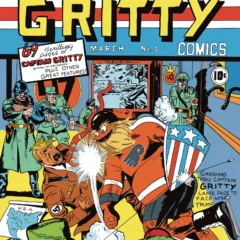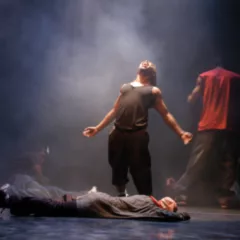[Donald reflects on Opera Philadelphia’s latest triumph–a moving look at the last years of Oscar Wilde’s life. — the Artblog editors]
As a writer, poet, and playwright, Oscar Wilde is unrivaled. The only part of Wilde’s life that the outside world reviled was his desire to truly be himself and embrace his sexuality. Opera Philadelphia’s East Coast premiere of Oscar is a character study that shows us the specific struggles Wilde experiences as he unapologetically tries to live the fullest life possible.
Oscar is a continuation of the American Repertoire Program, which Opera Philadelphia has developed into a fantastic canon of works destined to have lives of their own into the future. Veteran conductor Theodore Morrison composed the musical score and co-wrote the libretto with John Cox. This particular opera stands out because it features a well-known figure as its centerpiece and explores the darkest phase of Wilde’s life: the trials of Wilde v. Queensberry and Regina v. Wilde.
Wilde, unfree
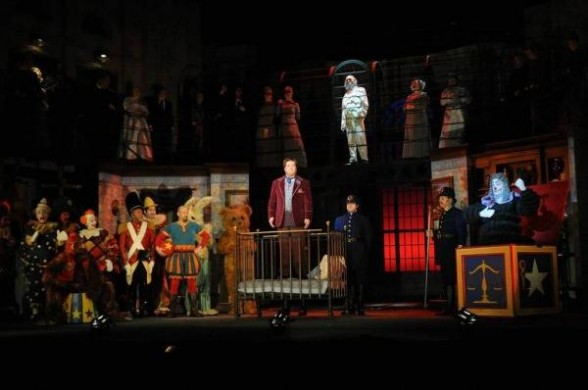
The opera starts with conductor Evan Rogister entering and generating applause as the curtain opens. As the enthusiastic applause dies down, we hear another equally enthusiastic, taped round of applause as Oscar Wilde, sung by celebrated countertenor David Daniels, comes out to greet his audience. Right away, we get a great sense of Wilde’s inimitable warmth and humor. From that point afterward, Wilde is out on bail awaiting the verdict on his trial of gross indecency. The opera follows Wilde through his bond with writer Ada Leverson and journalist Frank Harris; his trials and impending two-year sentence inevitably dismantle his life.
Daniels gives a fierce performance as Wilde, capturing his flamboyant charm and desire to do as he wishes through virtuosic runs and an emotional fervor. It is quite unusual for a countertenor to be the central lead of an opera, but it should be welcomed, as it is a nice change from the tenor and baritone roles that we’re accustomed to hearing in the opera repertoire.
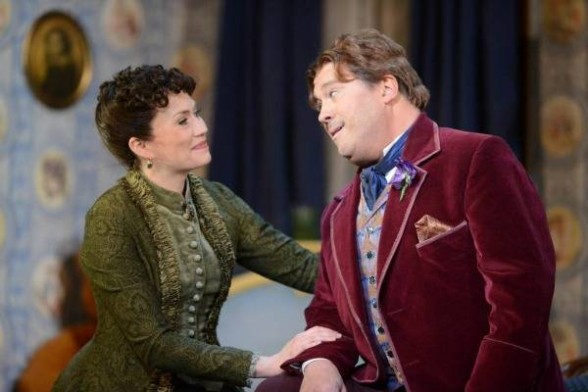
Real-life roles in Oscar include iconic writer Walt Whitman (Dwayne Croft), journalist Frank Harris (William Burden), and British writer Ada Leverson (Heidi Stober). Stober, a lovely soprano whose Golden Age Hollywood looks resemble a combination of Claudette Colbert and Jane Wyman, is the standout of the supporting cast as the only female character in an opera dominated by men. She lights up the stage in every scene she is in, steadfastly sympathetic towards Wilde. This was also Leverson’s Opera Philadelphia debut.
The trial scene might be the best scene in the opera. Here, the nursery that Wilde is staying in with Leverson morphs into the courtroom where Wilde is read his verdict. The scene cleverly acknowledges the circus-like atmosphere of the courtroom as it was reported back in 1895. The Opera Philadelphia Chorus plays life-size nursery toys, including bears, clowns, and jack-in-the-boxes, representing a biased and dictative jury.
Well-wrought portrayals of intimacy
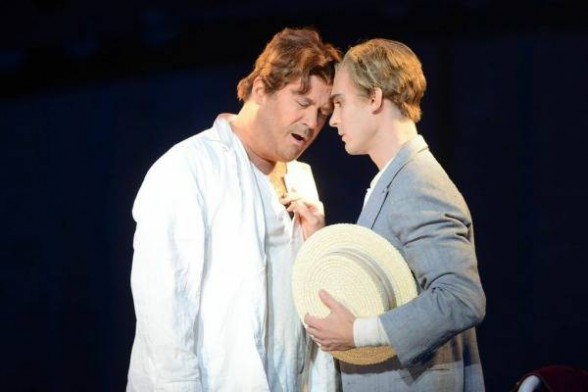
It’s nice to see a fleshed-out gay character without all of the typical stereotypes that come with portrayals of gay men. We also see this character engage dead-on with his orientation in scenes with Lord Alfred Douglas (nicknamed “Bosie” by Wilde) in which they intimately embrace and kiss. This is an aspect that is apparently swept under the rug in the Academy Award-nominated Alan Turing biopic “The Imitation Game”. Bosie is the production’s lone non-singing role, beautifully brought to life by dancer Reed Luplau in his Opera Philadelphia debut. Writing Bosie as a dancer was a nice touch, as it captures how seductive he was in Wilde’s eyes in a way that can’t be duplicated via voice.
Oscar is a wonderful work that makes the most out of a specific time period of Wilde’s life. In a lot of biographical performance works, you will see a well-known figure’s life sped through without getting to really know the person. Here, we get a detailed account of what Wilde’s dying years looked like for the man and the people that judged him all too harshly. Wilde once said, “To have done it was nothing, but to make people think one had done it was a triumph,” and this opera shows that above all of the noise around him, his life was indeed a triumph.
Oscar ran at the Academy of Music from Feb. 6-15. For more information on the remainder of Opera Philadelphia’s 2014-2015 season, please visit their website.


